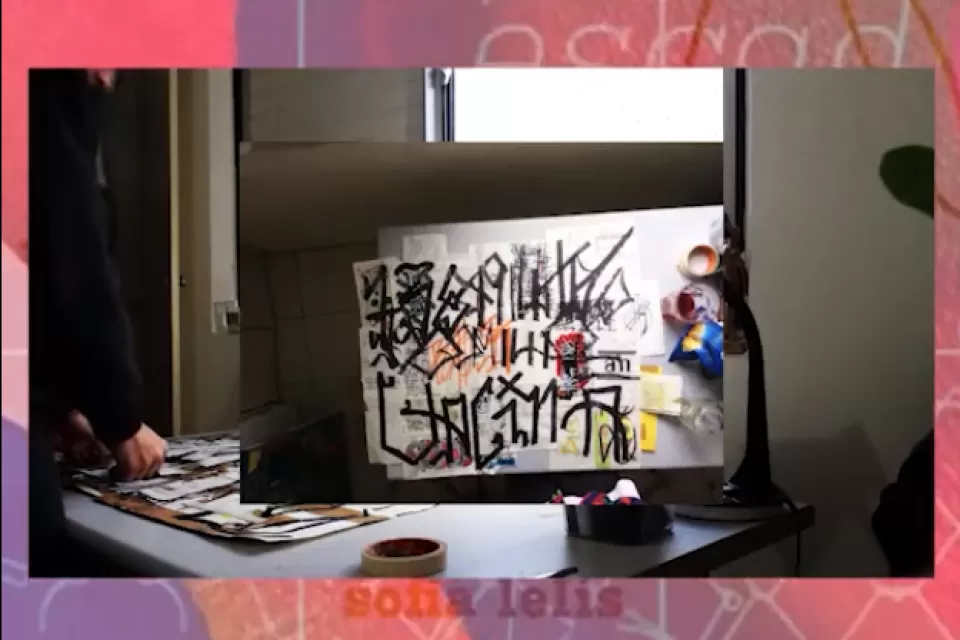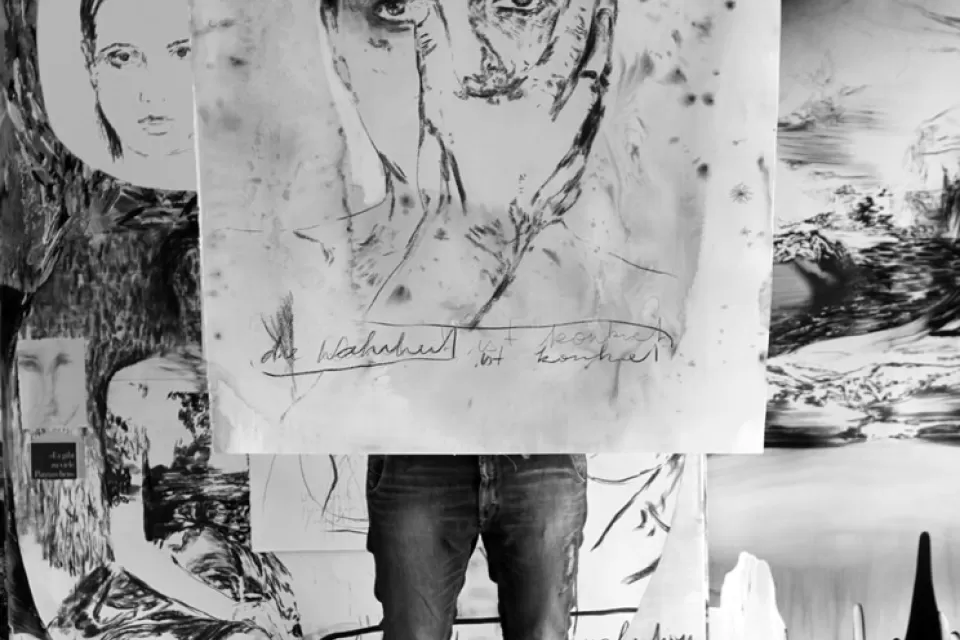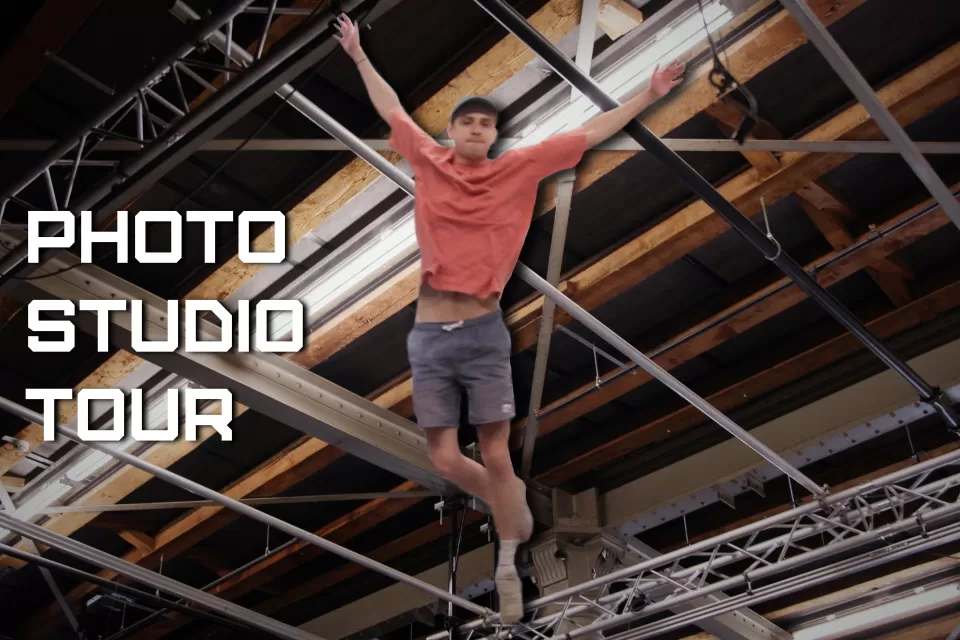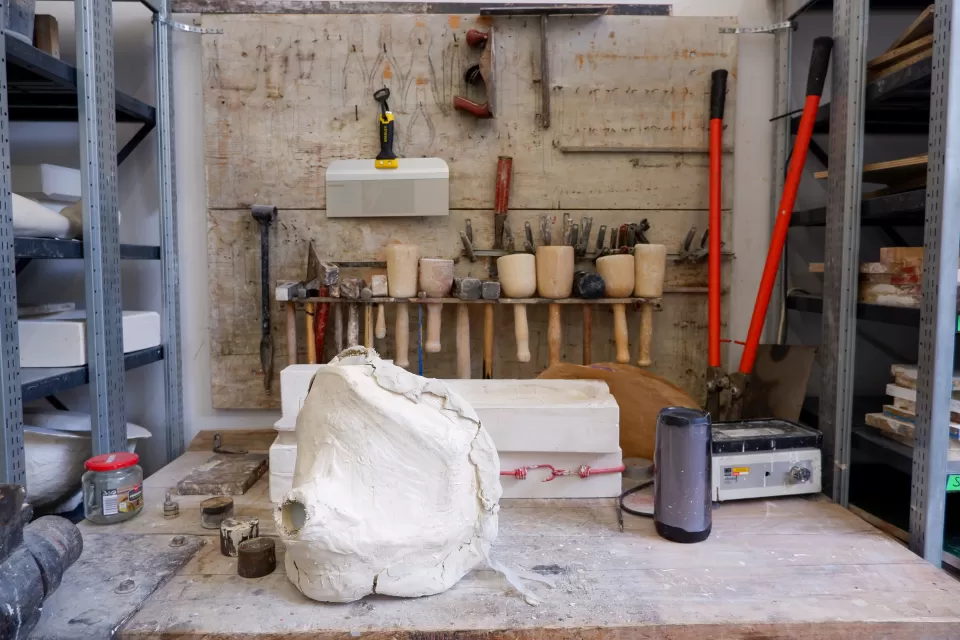Interviews with First Year Students: Leon
Author: Luiza Furtado (UGC)
Leon studies in his first year of the Academy in the Department for Art and Time I Photography. He studied Art before in Germany at Offenbach, in the fine arts program where they don't have a specific class or department, and one can freely choose where to go. There he studied mostly sculpture, painting, and electronic media. Which also makes up most of his current practice. at the moment he works mainly with sound and installation.
Luiza Furtado was born in Brazil. She lived in Rio de Janeiro for over 20 years, where she received her Bachelor's degree in Industrial Design from PUC University in 2021. She studies in the Contextual Painting class (new: Art and Image | Context) in the Institute of Fine Arts at the Academy of Fine Arts Vienna. Luiza Furtado's research on intuitive dance interweaves painting, soft sculpture and audiovisual media. She creates fabric capsules for symbolic rituals of empowerment and care. Her performative work is based on prosthetic experiments with upcycled textile craft from a queerfeminist perspective.
Luiza: When you make music how is it relating to space?
Leon: I think until now, these two things used to work separately. When I was doing the installation, it was just something to see and walk around. When it comes to sound, I would say that it's more of a musical thing, was mainly about listening. It's interesting for me to find a way to combine them to make installations that incorporate sound. But for now, I was just either doing music or three-dimensional work.
Luiza: How was your application and why did you choose the photo class?
Leon: That's a complicated or like even absurd part. I didn't choose the class, I applied for another the overall media department which is made up of three classes. For the class I initially was interested in, the professor didn't invite me, but the professor from the photo class did. I wasn't aware of him, and I wasn't interested in the class, because I don't do photography. But he invited me for the interview because he saw my portfolio and was interested. He told me in the interview that I would fit right into the class. Although it's a photography class, it's not bound only to photography, It's even called art and time I photography, being open to different practices.
People are doing all kinds of stuff and that could be interesting for new applicants. I mean, it's nice if they're interested in the particular medium, but it's not only about that. I think that's very important that you can experiment and work in different ways
Luiza: Was the admission exam somehow puzzling for you, how was your experience?
Leon: I did it online. I think since I already know this applying process I'm quite familiar with it, although it varies from university to academy and so on, but it was rather uncomplicated.
Luiza: The moving process to Vienna, like finding a flat. How was that going?
Leon: That was the second big part of coming here. And I think it shouldn't be underestimated. It was a long process, that you could divide into applying, making the portfolio, making works for the portfolio, wrapping it up, sending it and being invited, and doing the interview. And then you still have a lot of time to find a flat, which wasn't easy, especially towards the winter semester because a lot of people are moving to Vienna for other universities. It's a scenario where a lot of new people move into a city and the market for flats it's quite limited. I had to come here two times to do interviews in person, think it was harder for me to find a place to live than to get accepted.
Luiza: But are you happy now?
Leon: I'm happy now, yeah. I lived randomly with a guy that was in my class, I was very lucky. It's great. I recommend WG-gesucht which could be the most popular method for for new applicants.
Luiza: So there's no visa process because you're a German citizen, right?
Leon: Right. It's not that complicated.
Luiza: Did you have to do any kind of registration for your residency?
Leon: Yes, i had to get a "Meldezettel"
Luiza: Was it easy to find your courses, or would you have liked more guidance in the beginning?
Leon: It was pretty good. The most confusing part of being a first-year student is that you have to sign in for courses even before you're here. You can do it from the 12th of September onwards and the studies are starting on the 1st of October. I kind of forgot that, but I still got in for the courses I wanted. Even if the courses are full on the campus online platform, I recommend signing up for the waiting lists and than showing up for the first class and talk to the professors in person.
Luiza: How you would like your practice to change during this year?
Leon: I would like to get a deeper insight into my practice. Of course, try out different things, but, also have another perspective. I'm surrounded by new things, other people, another place. When I used to study in Germany, that was my hometown and I never left the place. And I think especially for the arts or anything really, it could be nice to just switch the setting and see what happens by not knowing everything. It's like a whole new cognitive type of work you're doing and this can resonate the way you work artistically.
Luiza: So, fresh input?
Leon: Yeah, in a way. There's a limit to how long it will be fresh, but that's quite a cynical point of view.
Luiza: Anything else you want to share?
Leon: I enjoy that It's quite an international setting here. Different people from places all over the world have a chance to be in a space to share thoughts and ideas and get to know each other.
Links to the studio Art and Time I Photography:
Further articles
The fields of study at the Academy of Fine Arts Vienna
Author: Christina Fasching (Red)
Author: Luiza Furtado (Red)



